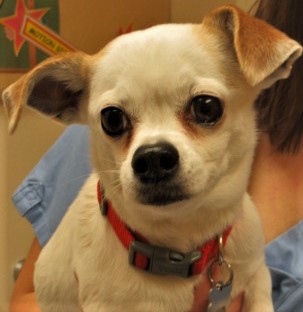
Meet Ali, she is a sweet little Chihuahua Mix and our pet of the month for May!
Ali was brought into Hawthorne Hills Veterinary Hospital because a red swelling was noticed on her bottom.
Ali was examined and it was found that she had an abscessed anal gland. All dogs and cats have two anal glands. Anal glands are scent glands that are located just inside the anus at 8 and 4 o’clock positions. Every time a dog defecates, a small amount of liquid from the anal gland is expressed onto the feces. Wild animals are able to express their scent glands voluntarily, but domesticated dogs and cats have lost this ability. When pets are startled or scared they will commonly express their anal glands. Anal gland secretions are varying shades of brown and have an extremely strong malodorous fishy smell.
Occasionally, anal glands can become impacted and your pet is unable to express the secretions themselves. This causes discomfort and dogs will scoot along the floor and/or lick. Many times your veterinarian can manually express the anal glands and this will take care of the problem.
Rarely, like Ali, anal glands can become infected and abscessed. This is very painful and uncomfortable. With an abscessed anal gland, you will see a red, swollen area just next to the anus. If the abscess ruptures you may even see a hole in the skin. This is the gland rupturing outward through the overlying skin.
 Ali’s anal gland was abscessed but had not ruptured. Since she was painful, it was decided to give her injectable pain relief and mild sedation. Once she was sedated and more comfortable, the veterinarian tried to manually express the anal gland. She was only able to partially express the anal gland contents through the normal anal gland duct opening. In order to fully express all of the infected anal gland material, a small incision was made in the skin where the anal gland was. All of the infected anal gland material was expressed and flushed out. The incision was left open so as not to trap any infection inside the gland.
Ali’s anal gland was abscessed but had not ruptured. Since she was painful, it was decided to give her injectable pain relief and mild sedation. Once she was sedated and more comfortable, the veterinarian tried to manually express the anal gland. She was only able to partially express the anal gland contents through the normal anal gland duct opening. In order to fully express all of the infected anal gland material, a small incision was made in the skin where the anal gland was. All of the infected anal gland material was expressed and flushed out. The incision was left open so as not to trap any infection inside the gland.
Ali was sent home with antibiotics and pain medication. All dogs will want to lick at the anal gland due to discomfort. Licking will prevent anal gland from healing. In order to prevent this, Elizabethan collars (or cones) are fitted until the anal gland is completely healed.
Ali was rechecked a week later and she was completely healed!
Some dogs will get repeated anal gland infections; this can sometimes be linked to allergies. Very rarely when the infections are frequent and severe, a salvage procedure is done where the anal glands are surgically removed. This is an absolute last resort. Luckily, the majority of dogs do not have any issues with their anal glands.
Further Reading
https://veterinarypartner.vin.com/default.aspx?pid=19239&id=4951501
https://www.vetmed.wsu.edu/outreach/Pet-Health-Topics/categories/diseases/anal-sac-disease
http://www.vetstreet.com/our-pet-experts/whats-the-deal-with-anal-sacs

